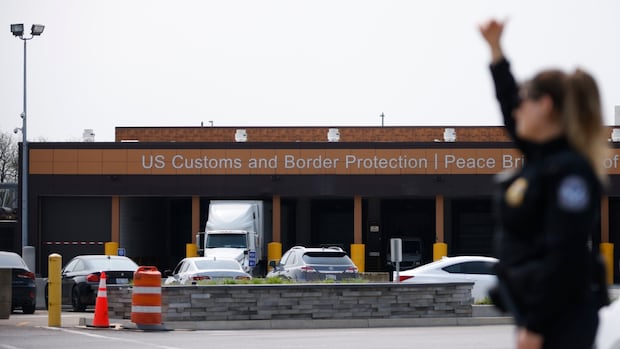U.S. Customs and Border Protection (CBP) has released new data showing a sharp rise in electronic device searches at border crossings.
From July to August alone, CBP conducted 14,899 electronic device searches, up more than 21 per cent from the previous quarter. CBP also reported a 36 per cent increase compared to all of last year’s third quarter. Most of those were basic searches, but 1,075 were “advanced,” allowing officers to copy and analyze device contents.
While electronic device searches jumped by 12.6 per cent over the past year, the total number of travellers entering the United States rose by 6.6 per cent. Among the most notable inceases are searches of U.S. citizens’ devices, which rose nearly 22 per cent.
Some immigration lawyers and travellers say these figures reflect heightened scrutiny under the second Trump administration.
Toronto-based immigration lawyer Heather Segal, who has worked on cross-border immigration cases for three decades, said her office has seen a growing number of complaints from Canadian travellers.
“Not a lot of the rules have changed in terms of entering the United States,” she said. “Yet the discretion has always been there. And so what we’re seeing is an exercise of discretion that’s much stricter than ever before.”
Segal said clients have told her they were asked about their political views, including their opinion of U.S. President Donald Trump.
“We’re not following the Constitution … there’s a lot of fear going into the United States. There’s the sense that everybody feels like they’ve done something wrong, but they don’t know exactly what it is.”
Detained, handcuffed and left without answers
For Angela Daigle of New Brunswick, a recent attempt to visit her fiancé in Maine turned traumatic.
“They had detained me in handcuffs, had me handcuffed down to a bench, and I was just really trying to ask them what was happening, and no one was really communicating with me,” she said, recalling an experience at the Houlton border crossing on Monday.
Her fiancé, David Slagger, a member of the Houlton Band of Maliseet Indians and Woodstock First Nation, said he believes she was flagged for carrying what officers considered “too many clothes” for a short visit.
Slagger said he too has been mistreated at the border.
On one occasion, he said, a CBP officer placed a hand on his service weapon and brandished a baton after questioning Slagger’s use of a Canadian-issued Indigenous status card.
He said they also confiscated a wooden drum he used for powwows, his medication and his phone.
“It amounts to fear-mongering,” he said. “And I said, ‘Look, don’t try to intimidate me. I know the law. I know my rights.'”
The couple has since decided to leave the U.S. and settle permanently in New Brunswick.
Experts warn of privacy implications

Cybersecurity expert Ritesh Kotak said he’s often asked how travellers can protect their data at the border.
“You could use a burner phone,” he said. “But at the end of the day, the lack of information on the device itself would be a red flag.”
Sociologist Nathan Kalman-Lamb, based in Fredericton, said he was required to hand over his phone during a recent trip to a conference in South Carolina.
“He claimed that it was just going to be a very cursory search,” Kalman-Lamb said, explaining the officer’s actions are legal.
“But the document that he gave me said they reserve the right to copy all the contents of your phone and distribute them to every American military and intelligence agency.”

Device searches are lawful and limited, CBP says
In a statement, CBP said electronic device searches remain a lawful and essential tool for identifying threats, combatting smuggling and enforcing immigration laws.
The agency maintains that only a small percentage of travellers are subject to such searches and officers operate under strict guidelines.
Reasons for secondary inspection can include incomplete documentation, suspicion of immigration violations or random selection.
Officers also have broad discretion to refer individuals for further screening.
Tips for travellers
Segal encourages Canadians to plan and know their rights, particularly those from communities that may face additional scrutiny.
“If you’re a nervous person, travel by air,” she said. “If you go by pre-flight inspection in Montreal, you’re adjudicated before you go into the United States. The worst possible-case scenario is they say, ‘No, you go home, you sleep in your bed.'”

She also advises carrying evidence of ties to Canada, such as a letter from an employer or proof of property ownership.
“I often counsel people, this is not a confession. They want specific information — give it to them and move on.”
As cross-border travel continues to decline, some Canadians say the experience of entering the U.S. no longer feels routine.
“We’re in a new normal,” said Segal. “I think realistic expectations of longer waits, potentially longer questioning, maybe going into secondary more, just should be assumed.”







